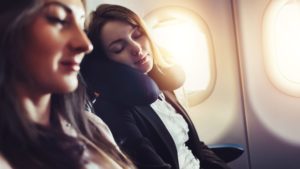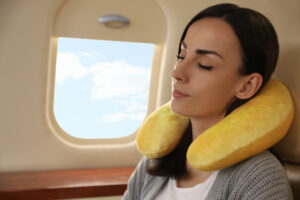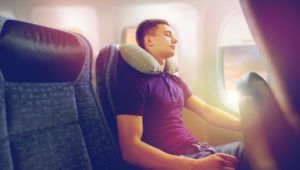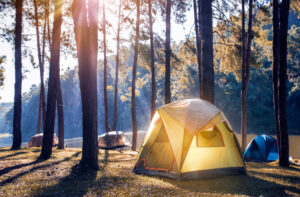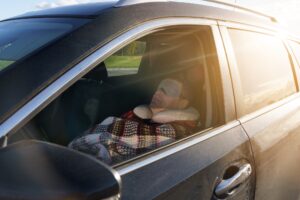Beverages To Avoid to Sleep Soundly While Traveling
Hydration is fundamental to health, and your hydration level is closely connected to the types and amounts of liquids that you drink.
On a big vacation or important business trip, though, wise beverage choices are rarely top-of-mind. If anything, many travelers opt for less healthy drinks than they would at home.
Regrettably, poor drink choices can negatively impact hydration, sleep, and overall wellness. Knowing which beverages to limit or avoid while traveling can reduce sleeping problems during a trip and help you return home feeling healthy and refreshed.
How Does What You Drink Affect Your Sleep?
The types of fluids that you drink affect your body’s hydration level. Dehydration can cause extreme fatigue and excessive drowsiness as well as dry mouth, headaches, and cramps that may interfere with sleep.
Beverages can also impact sleep because of their effect on the brain. Alcohol has a sedative effect but induces changes in the sleep cycle resulting in lower-quality sleep . Alcohol can affect breathing , increasing snoring and heightening the risk of sleep apnea.

Caffeine, on the other hand, is a stimulant, promoting wakefulness and alertness. It is commonly found in coffee, energy drinks, and many teas. The body takes four to six hours to metabolize half of the caffeine consumed, which means caffeine can have an enduring effect that may interfere with sleep.
When and how much you drink different beverages can affect sleep. Too much fluid consumption may contribute to frequent urination at night, known as nocturia, which can disturb sleep with repeated trips to the bathroom. Late night or significant consumption of alcohol or caffeine can also interfere with sleep.
Which Beverages Should You Limit or Avoid To Improve Sleep When Traveling?
Alcohol, coffee, tea, energy drinks, and soda can affect sleep and should be either avoided or used cautiously when traveling.
If you decide to drink any of these beverages, consider both the quantity and timing of their consumption. Drinking them in moderation and long before bedtime reduces their potential impact on sleep.
Alcohol
Because of their effect on the brain, alcoholic drinks can erode sleep quality even if they make you feel sleepier at bedtime. As a result, alcohol may worsen sleeping problems that can arise on a trip such as travel fatigue, jet lag, snoring, and sleep apnea.
Alcohol affects decision-making, which is another reason to limit consumption when traveling. Altitude enhances the effects of alcohol, which increases the risk of impairment on arrival after drinking on flights.
If you plan to drink alcohol during a trip, consume it in small quantities and ideally at least a few hours before bedtime.
Coffee and Tea
Coffee and many types of tea contain caffeine. Caffeine is generally safe in moderate quantities but can be harmful in excess or when consumed late in the day. Drinking coffee in the afternoon or evening can also negatively impact sleep.
Caffeine sensitivity varies from person to person. In general, it’s best to avoid caffeine for at least six hours — and ideally at least nine hours — before your planned bedtime to prevent sleep problems.
Earlier in the day, caffeine may provide a useful pick-me-up to counteract daytime sleepiness related to jet lag or travel fatigue. However, it’s important not to rely on caffeine at the expense of sufficient nightly sleep. The trick for optimal caffeine use is “little and often” — one cup of tea or weak coffee every one to two hours is sufficient to maximize alertness while minimizing the negative effects on sleep. More than that will not improve alertness further, but can introduce side effects such as jitteriness and dependency. Remember: caffeine is an addictive drug. Minimize use on days you don’t need it to enhance its benefits when needed.
Energy Drinks
Energy drinks are sold in a large format (12-16 ounces) or as energy shots (1-3 ounces) and usually include caffeine and other compounds intended to have a stimulant effect. Many energy drinks have high levels of sugar as well.
The quantity of caffeine in energy drinks is often considerably higher than that in coffee or tea. Rapid consumption of caffeine, such as through energy shots, can cause bodily stress from overstimulation.
Since energy drinks have a powerful stimulant effect, limit your consumption of them while traveling. Stay away from energy drinks for a minimum of nine hours before you plan to go to bed given their high caffeine content, don’t drink them with alcohol, and avoid rapidly consuming them.
Soda
Soda commonly contains caffeine and should be consumed in moderation and with caution in order to avoid sleep disturbances. As with other caffeinated drinks, avoid soda for at least six, and ideally nine, hours before bedtime.
Nutrition experts typically advise against significant soda consumption because these drinks have high quantities of sugar that detract from a healthy diet and can contribute to numerous health problems including weight gain and diabetes. Drinking diet sodas as a substitute may interfere with sleep as the body works to break down non-sugar sweeteners.
Carbonated Drinks
During plane travel, changes in air pressure can contribute to abdominal bloating . For this reason, consider avoiding or limiting consumption of carbonated beverages before and during a flight.
Contaminated Water and Beverages
An important consideration while traveling is making sure that you don’t drink contaminated beverages. In many locations, tap water is not potable and may contain harmful bacteria or viruses.
If you cannot confirm the safety of the local water supply, drink only sealed bottled water, and avoid drinks that may contain contaminated water or ice cubes.
What Are the Best Beverages To Drink While Traveling?
The best beverage to drink while traveling is water. Plain water provides your body with the hydration that it needs without alcohol, caffeine, or sugar that could affect your sleep. Sipping water throughout the day can prevent dehydration when you go to sleep.
If you don’t like plain water, low-calorie options like flavored water, seltzer, and sparkling water can help you stay hydrated. Milk, milk alternatives, and juices provide fluids along with other nutrients, but they should be consumed in moderation because of their caloric content.
The Centers for Disease Control (CDC) advise keeping oral rehydration salts, often sold in single-serve packets, in your travel pack. If you get sick with traveler’s diarrhea, oral rehydration salts can be mixed with water to help replenish necessary electrolytes . Bringing rehydration salts may be especially important if you travel to a location with known food or water contamination risks.

Still have questions? Ask our community!
Join our Sleep Care Community — a trusted hub of sleep health professionals, product specialists, and people just like you. Whether you need expert sleep advice for your insomnia or you’re searching for the perfect mattress, we’ve got you covered. Get personalized guidance from the experts who know sleep best.
References
12 Sources
-
MedlinePlus: National Library of Medicine (US). (2016, April 15). Dehydration., Retrieved January 29, 2021, from
https://medlineplus.gov/dehydration.html -
Pietilä, J., Helander, E., Korhonen, I., Myllymäki, T., Kujala, U., & Lindholm, H. (2018). Acute Effect of Alcohol Intake on Cardiovascular Autonomic Regulation During the First Hours of Sleep in a Large Real-World Sample of Finnish Employees: Observational Study. JMIR Mental Health, 5(1), e23.
https://pubmed.ncbi.nlm.nih.gov/29549064/ -
Centers for Disease Control and Prevention (2019, June 24). CDC Yellow Book 2020: Health Information for International Travel. Oxford University Press., Retrieved January 27, 2021 from
https://wwwnc.cdc.gov/travel/yellowbook/2020/travel-by-air-land-sea/jet-lag -
U.S. Food & Drug Administration. (2018, December 12). Spilling the beans: How much caffeine is too much?, Retrieved January 28, 2021, from
https://www.fda.gov/consumers/consumer-updates/spilling-beans-how-much-caffeine-too-much -
Wyatt JK, Cajochen C, Ritz-De Cecco A, Czeisler CA, Dijk DJ. Low-dose repeated caffeine administration for circadian-phase-dependent performance degradation during extended wakefulness. Sleep. 2004 May 1;27(3):374-81
https://pubmed.ncbi.nlm.nih.gov/15164887/ -
U.S. Department of Health and Human Services, National Institutes of Health, National Center for Complementary and Integrative Health (NCCIH). (2018, July). Energy Drinks., Retrieved January 29, 2021, from
https://www.nccih.nih.gov/health/energy-drinks -
Division of Nutrition, Physical Activity, and Obesity, National Center for Chronic Disease Prevention and Health Promotion. (2020, September 25). Rethink your drink. Centers for Disease Control and Prevention., Retrieved January 29, 2021, from
https://www.cdc.gov/healthyweight/healthy_eating/drinks.html -
Anjum, I., Jaffery, S. S., Fayyaz, M., Wajid, A., & Ans, A. H. (2018). Sugar beverages and dietary sodas impact on brain health: A mini literature review. Cureus, 10(6), e2756.
https://pubmed.ncbi.nlm.nih.gov/30094113/ -
Chan, V., & Allman-Farinelli, M. (2020). Efficacy of functional foods, beverages, and supplements claiming to alleviate air travel symptoms: Protocol for a systematic review. JMIR Research pPotocols, 9(3), e16155.
https://pubmed.ncbi.nlm.nih.gov/32217495/ -
Division of Nutrition, Physical Activity, and Obesity, National Center for Chronic Disease Prevention and Health Promotion. (2021, January 12). Water and healthier drinks. Centers for Disease Control and Prevention., Retrieved January 29, 2021, from
https://www.cdc.gov/healthyweight/healthy_eating/water-and-healthier-drinks.html -
National Center for Emerging and Zoonotic Infectious Diseases (NCEZID), Division of Global Migration and Quarantine (DGMQ). (2019, January 22). Pack smart. Centers for Disease Control and Prevention., Retrieved January 29, 2021, from
https://wwwnc.cdc.gov/travel/page/pack-smart -
Centers for Disease Control and Prevention (2019, November 22). CDC Yellow Book 2020: Health Information for International Travel. Oxford University Press., Retrieved January 29, 2021 from
https://wwwnc.cdc.gov/travel/yellowbook/2020/preparing-international-travelers/travelers-diarrhea


